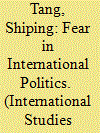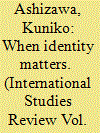|
|
|
Sort Order |
|
|
|
Items / Page
|
|
|
|
|
|
|
| Srl | Item |
| 1 |
ID:
083657


|
|
|
|
|
| Publication |
2008.
|
| Summary/Abstract |
There are two-and only two-fundamental positions on how to cope with the fear that is derived from the uncertainty over others' intentions in international relations (IR) literature. Because these two positions cannot be deduced from other bedrock assumptions within the different IR approaches, the two positions should be taken as an additional bedrock assumption. The first position, held by offensive realism, insists that states should assume the worst over others' intentions, thus essentially eliminating the uncertainty about others' intentions. The second position, held by a more diverse bunch of non-offensive realism theories, insists that states should not always assume the worst over others' intentions and that states can and should take measures to reduce uncertainty about each others intentions and thus fear. These two different assumptions are quintessential for the logic of the different theoretical approaches and underpin some of the fundamental differences between offensive realism on the one side and non-offensive realism theories on the other side. Making the two positions explicit helps us understand IR theories and makes dialogues among non-offensive realism theories possible.
|
|
|
|
|
|
|
|
|
|
|
|
|
|
|
|
| 2 |
ID:
083661


|
|
|
|
|
| Publication |
2008.
|
| Summary/Abstract |
This essay contributes two arguments on the place of democratic norms in democratic peace. First, the literature under-appreciates the inter-democracy moral constraint hypothesis: the hypothesis is ignored in the "critical test" of the most frequently cited article on democratic peace and research finding that joint democracy has consistently contributed to peace since the early twentieth century, particularly among developed states; fits with inter-democracy fights in the ancient world; is attuned to the possibilities that democracy carries less moral weight in joint democracy dyads with non-Western states and imposing regime-change can bring resentment that countervails respect deriving from joint democraticness; and is free of the presumptions of democratic moral superiority abroad and autocratic inclination toward aggression. Second, the absence of a determinate correspondence between domestic and external agency, structure, and action makes inevitable that members of democracies will hold competing views on "extending" domestic norms abroad; yet, just as this diminishes the extension hypothesis as a general explanation of democratic peace, it makes government-level orientation on the extension of domestic norms an important shaper of democracy war-proneness and the ways in which democracies get involved in wars. Various democratic peace research designs are inconclusive if a government foreign policy orientation variable is omitted. The study's two arguments provide insight into specifying foreign policy orientations
|
|
|
|
|
|
|
|
|
|
|
|
|
|
|
|
| 3 |
ID:
083660


|
|
|
|
|
| Publication |
2008.
|
| Summary/Abstract |
Despite the vast literature on the economic and social affects of micro-financing in poor countries, little attention has been given to its political implications. At a time when the broader development implications of micro-financing are being recognized-thanks, in part, to the Nobel Prize Award to Prof. Yunus and the Grameen Bank-political scientists have an opportunity to contribute to and learn from the study of this financial instrument. This paper traces the existing microcredit-and more broadly the microfinance-literature to delineate the ways in which microcredit can contribute to the political awareness and activism of the poor, i.e., their political empowerment. I argue that the link between microcredit and political empowerment is self-efficacy and social capital, which can be generated from a particular form of microcredit lending where clients apply for loans as a group and share responsibility for repayment. Furthermore, I make the case for why the Central Asia and Caucasus region would provide an appropriate case to analyze the political effects of microfinance. Research in this area will not only fill an obvious gap in the literature, but it will also help microfinance institutions, donor communities and governments to better understand the wider political implications of microfinance and the ways by which to measure them
|
|
|
|
|
|
|
|
|
|
|
|
|
|
|
|
| 4 |
ID:
083655


|
|
|
|
|
| Publication |
2008.
|
| Summary/Abstract |
What role do international business norms play in regulating the behavior of firms? Despite growing acceptance of the constructivist claim that norms play an important role in international life and an increased interest in private authority by international relations (IR) scholars, surprisingly little research in the field has explored the extent or mechanisms by which norms influence the behavior of firms. I argue this oversight has more to do with the bias in political science against viewing firms as social or socializable institutions than with the applicability of constructivist theory to firms or markets. To make this argument I examine the spread of sustainability norms across transnational business networks and illustrate how theories of socialization developed by IR constructivist scholars can help explain the rapid spread of these norms and the effects they have on corporate environmental governance. The paper ends with a call for more research on the effects of international business norms and makes several suggestions for how to counteract the bias in political science against doing so.
|
|
|
|
|
|
|
|
|
|
|
|
|
|
|
|
| 5 |
ID:
083658


|
|
|
|
|
| Publication |
2008.
|
| Summary/Abstract |
This article re-engages international relations' (IR) longest debates on "where" and "why" global politics happens: the levels-of-analysis debate and the agent-structure debate. It argues for the continuing relevance of the conceptual questions contained in these debates, but critiques the inadequacy of current iterations of those debates in the international relations literature. In it, I introduce to political scientists political geographers' concept of scales and scalar processes to replace levels, agents, and structures. I outline the benefits of such an approach for the substance and method of IR's studies of global politics. I then formalize a scalar approach to global politics in six principles, modeled after Morgenthau's six principles of political realism. The article concludes with suggested directions for a scalar approach to IR, focusing on reformulations of IR's approaches to the study of the War on Terror.
|
|
|
|
|
|
|
|
|
|
|
|
|
|
|
|
| 6 |
ID:
083656


|
|
|
|
|
| Publication |
2008.
|
| Summary/Abstract |
Since the Nuclear Nonproliferation Treaty (NPT) came into force almost 40 years ago, only four states have acquired nuclear weapons. What accounts for such near-universal compliance? This paper argues that social psychology can help us understand the puzzle of nuclear restraint in two ways. First, nuclear forbearance should be unpacked into three outcomes: persuasion (behavior resulting from genuine transformation of preferences), social conformity (behavior resulting from the desire to maximize social benefits and/or minimize social costs, without a change in underlying preferences), and identification (behavior resulting from the desire or habit of following the actions of an important other). Second, through social psychology, we can specify the mechanisms by which the norm of nonproliferation has influenced policymakers. Indeed, the case of Japan shows that both these contributions help us better understand nuclear decision-making and offer larger insights into regime compliance more generally.
|
|
|
|
|
|
|
|
|
|
|
|
|
|
|
|
| 7 |
ID:
083662


|
|
|
|
|
| Publication |
2008.
|
| Summary/Abstract |
Over the last decade, the international relations field witnessed a surge in literature dealing with the concept of identity, a trend that is likely to continue. At the same time, the multi-directional focus of the current identity literature, together with the rather loose application of the term "identity", leaves some observers sceptical about the validity and utility of identity as an analytical concept. With this backdrop, the article seeks to articulate an essential mechanism by which identity functions as a source of a state's foreign policy: A concept of state identity generates a specific value (a pro attitude toward a certain kind of action), which in turn determines a state's preference for a particular foreign policy option. This causal mechanism is then demonstrated by the empirical analysis of Japan's foreign policy toward post-Cold War regional institution-building. Further, by placing the identity mechanism within the value-action framework of general foreign policy, the study raises concern about the conditions by which identity becomes a prominent factor, that is to say when identity matters. Along this line, the study highlights the context-dependent and versatile natures of identity's function, and therefore, it cautions against overly deterministic approaches toward the role of identity in foreign policy and international relations.
|
|
|
|
|
|
|
|
|
|
|
|
|
|
|
|
| 8 |
ID:
083659


|
|
|
|
|
| Publication |
2008.
|
| Summary/Abstract |
In this paper, we identify authority as an important dimension of variance among international institutions. Essentially, the greater the authority of i states have yielded to them. Highly authoritative institutions can make decisions that legally bind domestic governments on specified issues even without those governments' consent. Over the past 20 years, scholars have viewed the evolution of international institutions largely through the lens of state motives. We argue that it is time to think more systematically about the role of the structure of the international system. Two factors that impact international structure-previously existing institutions and the presence of systemic shocks-can complement theories of actor motives to better account for the level of sovereignty yielded to authoritative international institutions. We illustrate the potential importance of including structural variables by applying the argument to sets of cases in currency cooperation and human rights. We find that structural factors increase the probability of states yielding sovereignty to international institutions, though structural factors are only a permissive cause of institution formation
|
|
|
|
|
|
|
|
|
|
|
|
|
|
|
|
|
|
|
|
|